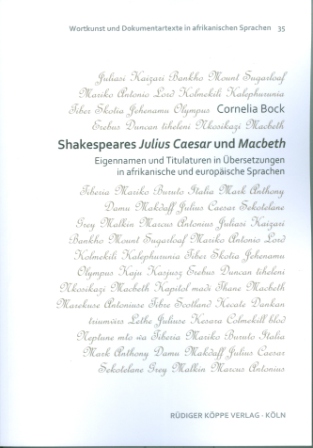
Shakespeares Julius Caesar und Macbeth
Eigennamen und Titulaturen in Übersetzungen in afrikanische und europäische Sprachen
Author: Cornelia Bock. Series edited by: Wilhelm J.G. Möhlig †.
Series: WK Verbal Art and Documentary Literature in African Languages Volume 35
201512 pp. Roman, 162 pp.
70 tables
Text language(s): German
Format: 170 x 240 mm
430 g
Paperback
€ 29.80
Buy 'Shakespeares Julius Caesar und Macbeth' as a downloadable PDF document directly from our online shop »
Order 'Shakespeares Julius Caesar und Macbeth' as print edition »
Even after his 450th birthday, William Shakespeare is still well-known and cherished around the world. His opuses are read and staged in many countries and in different languages. New editions of his dramas and sonnets appear regularly both in the original language English and in other languages – indeed Shakespeare is the most often translated author worldwide. The topics he deals with in his works are considered as universal, and he is not only regarded as an English or European writer. The historical plays stimulate reflection over one's own history. Particularly the tragedy Julius Caesar is a strongly political drama, and its guiding theme of regicide and hope for a new political system can easily be translated to another time and place.
Translations of literary works are of vital importance because they offer the opportunity to become acquainted with authors, stories, cultures, ideas and values of societies other than one's own even without mastering the language in question. Furthermore, translations make sure that the original opus survives and overcomes temporal as well as spatial distances. A language itself may actually grow or develop through translations, as in many cases where the simple borrowing of connotations, allusions and references from the original language is not feasible, adequate substitutes have to be found in the target language. Realia and proper names are crucial elements of literary works due to the fact that they characterise places and figures and embed the story into a certain society with socio-cultural values. These two aspects are interesting and revealing for both translation science and the study of literature as well as for onomatology, since the analysis of their treatment in translations is suggestive of the general modus operandi of translators and of the norms and conventions of translation in a given linguistic community.
It is these processes and features that the present book is intended to shed light on as well. Taking the examples of Shakespeare's Julius Caesar and Macbeth, the initial question is how individual translators deal with proper names and titles or forms of address, i.e. which strategies they adopt to translate these items from the source text into the target text. Of further interest is the question if there are differences with regard to the treatment of personal and place names as well as proper names as allusions, and if and how this might be distinct from the treatment of titles and forms of address.
This array of questions is first examined on the basis of translations into African languages which build the focus of this study. Subsequently, translations into European languages are analysed in order to conclusively answer the question if the handling of proper names and titles in translations into African languages differs from that of translations into European languages, what makes up this possible difference and what are the reasons for it. The author proceeds on the assumption that the translations into African languages exhibit greater deviations from the original English text which most notably occur with proper names as allusions and with titles, since the former require specific knowledge on the readers' part and the latter are cultural concepts – the reason for this difference being the greater linguistic, spatial and particularly cultural distance between Shakespeare and the translators and readers of African languages.
Cross-reference:
- Bole Language and Documentation Unit BOLDU, Report I
(ISBN 978-3-927620-48-3 ) - La dynamique des noms de personnes chez les Ding de la République démocratique du Congo (1885–1960)
(ISBN 978-3-89645-896-4 ) - Ortsnamen in Borno (Nordnigeria)
(ISBN 978-3-89645-465-2 ) - Place Names in Borno and Yobe States (Northern Nigeria)
(ISBN 978-3-89645-194-1 ) - Swahili Plants
(ISBN 978-3-927620-89-6 ) - The Mukogodo Maasai
(ISBN 978-3-927620-86-5 )
| « back | Print version | [top] |
 Books
Books Audio
Audio Biographies
Biographies Series
Series Festschrifts
Festschrifts Journals
Journals